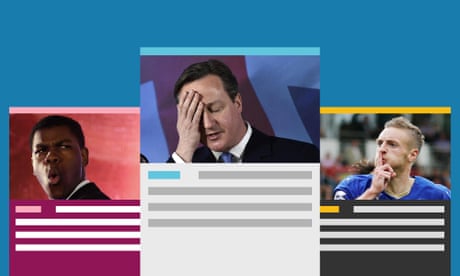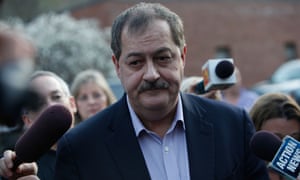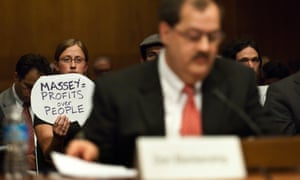
(Rachel Orr, The Washington Post)
CALL him whatever names you like. A clown. A Know Nothing. A political greenhorn who can barely complete a sentence. A nativist, a racist and -- worse -- a New York liberal with a comb-over.
You can call him a blowhard if you want, but -- to the consternation of the conservative elite and to the surprise of just about everybody else inside the Beltway -- Donald Trump won't blow off.
The press mocked his rambling, hour-long speech at the launch of his campaign, in which he disparaged Mexican immigrants as "rapists." Few thought he could remain popular after saying that Sen. John McCain (R-Ariz.), imprisoned for more than five years in Vietnam after his plane was shot down, was "not a war hero." Political scientists forecast that Trump would fade.
But as the summer of Trump lingers into autumn, the real estate magnate remains the front-runner in the Republican presidential primary. The political establishment is flummoxed, and at least one of its members has concluded that Trump's supporters are just insane.
"What he did was, he fired up the crazies," McCain said after Trump held a rally in Phoenix.
From a psychological perspective, though, the people backing Trump are perfectly normal. Interviews with psychologists and other experts suggest one explanation for the candidate's success -- and for the collective failure to anticipate it: The political elite hasn't confronted a few fundamental, universal and uncomfortable facts about the human mind.
We like people who talk big.
We like people who tell us that our problems are simple and easy to solve, even when they aren't.
And we don't like people who don't look like us.
Most people share these characteristics to some degree, but they seem to be especially prevalent among Trump's base. Trump's appeal certainly has other sources, too, such as the nostalgia he so skillfully evokes, his financial independence from special interests, and the crucial fact that he had his own reality TV show. Some Republicans like Trump's anti-establishment approach. And many support Trump because of his substantive positions -- his views on immigration, his antipathy toward China, his defense of Social Security, or his opposition to tax deductions for wealthy bankers.
But given the gap between public support for Trump and elite opinion, it may be worth thinking about the ingrained predilections for confidence, simplicity and familiarity that are just a few of the reasons that psychologists gave when asked to explain exactly how Trump got yuge.
"Really, we're not giving people enough credit," argues John Hibbing, a psychologist at the University of Nebraska, Lincoln. "We have to take this seriously. You can look down your nose if you want to, but these people aren't going away."
We like big talkers
"If you're running for president, you should not be allowed to use a teleprompter," Trump likes to say. He doesn't on the stump. As a result, his typical speech is a congeries of tangents and digressions.
Even if Trump showed any strong inclination to speak in complete and eloquent sentences, though, his wildly cheering crowds wouldn't let him finish one.
Trump doesn't give the kinds of speeches that political consultants are used to hearing. He certainly doesn't deliver lines that are carefully formulated for applause and for prime-time sound bites. His style has been called a "word salad."
Still, he is an effective speaker, psychologists say. In fact, decades of research show that charisma has more to do with a person's demeanor than what he or she is saying, says Stanford University's Jeffrey Pfeffer.
In one series of well-known experiments conducted by the psychologists Nalini Ambady and Robert Rosenthal, subjects were able to predict how students in a college classroom would evaluate their teachers at the end of the term, based on 30 seconds or less of soundless footage of the instructor. The subjects in the study couldn't hear the words coming out of the instructor's mouth, but what mattered for the students was gesture and affect, not substance.
Voters listening to politicians on television are just like the students in those classrooms, says Pfeffer, a psychologist who studies leadership.
"Most of the electorate would not pass a test on what anybody's positions are on anything," he said. "Nobody cares." Conservative voters, for instance, seem not to mind Trump's favorable comments on national health insurance andeminent domain.
What can win over voters is what Pfeffer called "narcissism."
"They're responding to dynamism, to force, to movement, to smiling, to facial expressions that convey authority," he said. Trump "does it with more force. He does it with more energy. Energy is contagious."
Arie Kruglanski, a psychologist at the University of Maryland, compares Trump's campaign to President Obama's in 2008. The two men have different styles, but both have animated their supporters with confident claims about the future.
"It's the audacity of those promises in those circumstances that really carries a lot of weight," Kruglanski said, "and it's the emotional, as opposed to the kind of deliberative, rational appeal that carries the day."
Both conservative and liberal voters can be susceptible to this kind of thinking. In other ways, though, psychologists believe that conservative and liberal minds work differently, which could help explain Trump's success with Republicans.
We want answers
The world can feel like a complicated place. There may be no good answers to the problems we confront individually and as a society. It is hard to know whom or what to believe. Things are changing, and the future might be different in unpredictable ways. For many people, this uncertainty is deeply unpleasant.
"People are just inclined to say, 'Okay, to hell with it. I'm not going to figure it out,' " Kruglanski said.
That desire is especially strong among social conservatives, research shows. They want answers, more so than other people.
One way that psychologists measure these preferences is by giving people a questionnaire that poses statements such as, "It's annoying to listen to someone who cannot seem to make up his or her mind," "I dislike it when a person's statement could mean many different things" and "In most social conflicts, I can easily see which side is right and which is wrong."
Conservative subjects are more likely to agree with these statements, whether psychologists give this test in the United States, Germany, Italy, Belgium orPoland.
Over the years, conservative commentators have objected to this characterization of their beliefs. They argue that conservatism isn't a psychological condition, but a set of ideas with a rich intellectual history, developed across generations through rational deliberation.
For their part, psychologists have responded that they aren't dismissing conservativism as irrational. After all, just because people are predisposed to believe something doesn't make them wrong. Saying someone is more likely to find an argument persuasive because of their psychology doesn't invalidate the argument. As psychologists see it, the desire for simplicity is just a fact about the way people think — one that several decades of research has now confirmed.
Hibbing of the University of Nebraska says this need for clarity is important to understanding Trump's support.
"People like the idea that deep down, the world is simple; that they can grasp it and that politicians can't," Hibbing said. "That's certainly a message that I think Trump is radiating."
At Hibbing's laboratory, he and his colleagues study how conservative and liberal subjects react to unpleasant images, such as insects and injuries. They use cameras to track the motion of their subjects' eyes and place electrodes on their skin. Other researchers study the contractions of facial muscles and electrical activity in the brain.
These experiments show that conservative subjects react differently from liberal ones. They sweat more heavily when shown a picture of a dangerous animal. Their pupils focus on disgusting images, and they don't look away.
It's evidence that we don't develop political affiliations just by rationally evaluating competing philosophies and ideologies. Our opinions also have origins beneath the level of conscious thought, in our bodies and our brains.
In that sense, the desire for simplicity could be physical. And Trump has a way of responding to complicated questions as though the answers were so obvious, he is dumbfounded that no one else has figured them out yet.
A recent interview with Bloomberg News reveals this approach.
After nearly allowing himself to be drawn into a debate about whether women should be able to have abortions early in their pregnancies, he brushed the question aside.
"I'm pro-life, but with the caveats. It's: Life of the mother (very important), incest and rape," Trump said.
"Say a woman is pregnant, and it's not in any of those exception categories and she chooses to have an abortion," Bloomberg's Mark Halperin said.
"It depends when," said Trump, interrupting him.
"Let's say, early in her pregnancy," Halperin said.
Trump did not answer the question about timing. Perhaps he realized he was about to enmesh himself in nuance.
"Mark, it's very simple," he said. "Pro-life."
And Trump just dismisses experts on security who say his plans to build a wall along remote stretches of the Mexican border would be extremely expensive, if not practically impossible.
The wall "is absolutely buildable and can be built for far less cost than people think," he said when asked about these criticisms. "It's not even a difficult project if you know what you're doing."
We put ourselves into groups
Following Obama's victory in his last election, the Republican National Committee produced a report calling on the party to do a better job of appealing to voters of color, especially Hispanic voters. More specifically, the Republican Party has long argued that if the economy is larger, everyone will be better off. Republican proponents of immigration reform often cite studies predicting substantial gains in economic performance.
Trump has done the reverse, appealing to people who could be especially averse to the presence of immigrants in their communities. The notion that improving the lives of immigrants would also help people living here already is profoundly counterintuitive, experts say, and that could be one reason that so many people find Trump's anti-immigration rhetoric so persuasive.
"Humans have a kind of tribal psychology," said Joseph Henrich, a biologist at Harvard University who studies the species's evolution.
In particular, humans tend to assume that if one group is getting more, another group must be getting less. We have a hard time understanding that two groups can both be getting more of something at the same time. Call it a cognitive blindspot, or a psychological illusion.
Henrich believes this zero-sum outlook could be a result of millennia of competition among our ancestors for limited resources such as land and mating partners. "You can find some degree of it in every human society," he said. "It varies dramatically across societies and populations, but it does pop up everywhere."
There is also evidence that this possibly ancient predisposition is shaping American politics today. Michael Norton, a psychologist at the Harvard Business School, has found that on average, whites now view discrimination against members of their own race as a larger problem than discrimination against blacks.
His explanation is that whites see competition between groups as zero sum. Whites assume that they must be worse off, since the legal and economic situation for blacks has improved. Research also suggests that white voters with stronger prejudices against African Americans are more likely to support the conservative GOP faction known as the tea party.
Norton speculates that antipathy toward Latino immigrants has the same psychological source.
"What Trump is tapping into is the mindset of a zero-sum game," Norton said, which he called an "intuitive" way of looking at the economy and society.
"It's hard to imagine that if we're eating a pizza, that adding more people would somehow give us more pizza. It takes a much-longer-term perspective," Norton said.
The presence of immigrants could also compound other psychological responses, such as how conservatives deal with uncertainty. Kruglanski of the University of Maryland and his colleagues found that in the Netherlands, residents were less comfortable with uncertainty the more Muslims lived in their neighborhoods.
While immigration is good for the economy on the whole, there is some evidence that it can reduce the wages of unskilled workers born in the country. Trump draws heavily on less educated, blue-collar white voters for his support. Some people in this group may be right to see immigration as a zero-sum game.
Economists fiercely debate this point, but in any case, their arguments probably have less influence over voters than do the facts of human psychology.
It's not just Trump, but human nature
Trump has lost several percentage points in the polls recently. Maybe the infatuation is wearing thin, or maybe not. Either way, his candidacy has already revealed something important about this country, about the Republican Party and, above all, about who we are as people.
To win the nomination, he will have to win over some voters who now support his rivals, which he might not be able to do. If Trump can't gain support, though, he may also not lose it, either. He is, in part, the product and the image of our species's unconscious and its unchanging predispositions.
Human nature, though, is not destiny -- or so argues Hibbing of the University of Nebraska. Our innate propensities can be overcome through persuasion and principled leadership in the long term, he said.
He compares the human mind to an ocean-going tanker. Changing the ship's direction takes time, and a map with the new course clearly marked. Instead of dismissing them as crazies, political leaders will have to acknowledge their constituents' biases against all that is complex, uncertain and unfamiliar.
"I don't think we can pretend that that's not who we are," Hibbing said.











